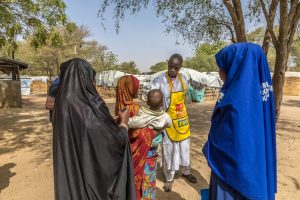In June 2020, a significant milestone is expected for polio eradication and global health: the certification of the WHO African Region as wild polio-free. The end of wild polio across the entire Region represents a major steppingstone toward global polio eradication; with this certification, five of the six WHO regions will be wild polio-free. In February 2020, Nigeria, the last polio-endemic country in Africa, conducted vaccination campaigns. This photo story documents the following activities: Innovation: new technologies such as GIS, phone applications, solar power for vaccine cold chain transport. Human effort: people travelling great distances through difficult/insecure terrain to provide vaccines to children. Polio heroes: people who have made great sacrifices of lost their lives delivering vaccines as well as survivors who have achieved much despite their disabilities. More information about https://www.afro.who.int/node/11759
